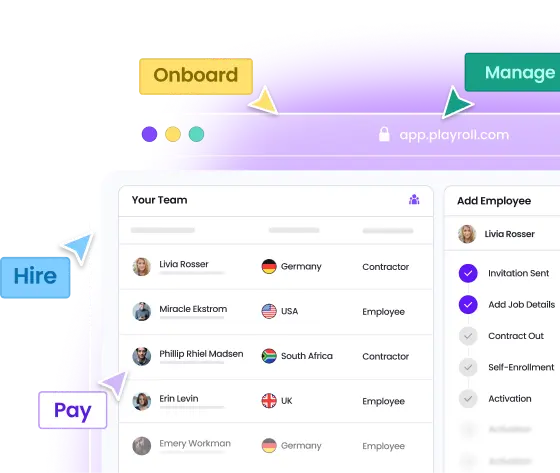What Are the Standard Working Hours in Latvia?
In Latvia, the standard workweek is 40 hours, typically spread over five days (Monday to Friday), with eight hours per day. Employees must have at least 12 hours of uninterrupted rest between workdays, ensuring a weekly rest period of 42 hours. If an employee's daily working time exceeds six hours, they are entitled to a break of at least 30 minutes, which must be provided no later than four hours after the start of work.
Maximum Working Hours in Latvia
Latvian labor law sets clear boundaries to protect employees from excessive working hours:
- Daily Limit: An employee's regular daily working time must not exceed eight hours.
- Weekly Limit: The regular weekly working time must not exceed 40 hours.
- Overtime: Any work performed beyond the standard working hours is considered overtime.
Industry-Specific Exceptions
Certain industries in Latvia have unique working hour regulations:
- High-Risk Jobs: Employees in high-risk jobs, such as those involving special risks to health and safety, have reduced working hours: a maximum of seven hours per day and 35 hours per week.
- Young Workers: Employees aged 15 to 18 are restricted to working a maximum of seven hours per day and 35 hours per week. Additionally, they are prohibited from working during night time (10 PM to 6 AM).
- Part-Time Employment: Part-time employees have working hours shorter than the regular daily or weekly working hours. The specific hours are agreed upon in the employment contract.
Managerial and Exempt Employees
Managerial and exempt employees in Latvia are typically those with autonomous decision-making powers. These employees may not be subject to the standard working hour limits. However, they must still adhere to general labor protections, including rest periods and overtime compensation, unless specifically exempted by law or collective agreement.
Statutory Full-Time Working Hours in Latvia
Full-time employment in Latvia is legally defined as a workweek of 40 hours. This standard applies across most industries and roles, ensuring consistency in employment practices.
Overtime Regulations in Latvia
Overtime regulations in Latvia are designed to balance the needs of employers with the well-being of employees.
What Counts As Overtime in Latvia?
In Latvia, overtime refers to any work performed beyond the standard 40-hour workweek. Employers must obtain written consent from employees before assigning overtime. Overtime work must be compensated at a rate of at least 100% of the regular hourly or daily wage. Employers are also required to maintain detailed records of working hours for a minimum of three years.
Maximum Overtime in Latvia
Overtime work in Latvia is subject to specific limits:
- Weekly Limit: Overtime work should not exceed an average of eight hours within a seven-day period, calculated over a reference period that does not exceed four months.
- Annual Cap: The maximum amount of overtime an employee can work is 200 hours per year.
Overtime Payout Rates in Latvia
Overtime compensation in Latvia is structured as follows:
- Standard Overtime: Overtime work is compensated at a rate of at least 100% of the regular hourly or daily wage (double the standard wage).
- Holiday Night Overtime: Overtime work during holiday nights must be compensated at no less than 2.5 times the regular wage.
Rest Periods and Breaks in Latvia
Latvian labor law mandates specific rest periods and breaks to ensure employee well-being:
- Daily Rest: Employees are entitled to a minimum of 12 consecutive hours of rest within a 24-hour period.
- Weekly Rest: Employees are entitled to a minimum of 42 consecutive hours of rest within a seven-day period.
- Breaks During Workday: Employees working more than six hours per day are entitled to a break of at least 30 minutes, which must be provided no later than four hours after the start of work.
Night Shifts and Weekend Regulations
Latvian labor law includes specific provisions for night shifts and weekend work:
- Night Work: Night work is defined as work performed between 10:00 PM and 6:00 AM. Employees who regularly work at least three hours of their daily working time or at least one-third of their annual working time during the night period are considered night workers.
- Weekend Work: Weekend work (typically Saturday and Sunday) is generally considered rest time. If an employee is required to work on their designated weekly rest days, they are entitled to increased remuneration, similar to overtime rates, or compensatory rest time, as agreed. Work on public holidays also requires increased compensation.
Disclaimer
THIS CONTENT IS FOR INFORMATIONAL PURPOSES ONLY AND DOES NOT CONSTITUTE LEGAL OR TAX ADVICE. You should always consult with and rely on your own legal and/or tax advisor(s). Playroll does not provide legal or tax advice. The information is general and not tailored to a specific company or workforce and does not reflect Playroll’s product delivery in any given jurisdiction. Playroll makes no representations or warranties concerning the accuracy, completeness, or timeliness of this information and shall have no liability arising out of or in connection with it, including any loss caused by use of, or reliance on, the information.
.svg)
.svg)
.svg)





.svg)



.png)












.webp)









.svg)